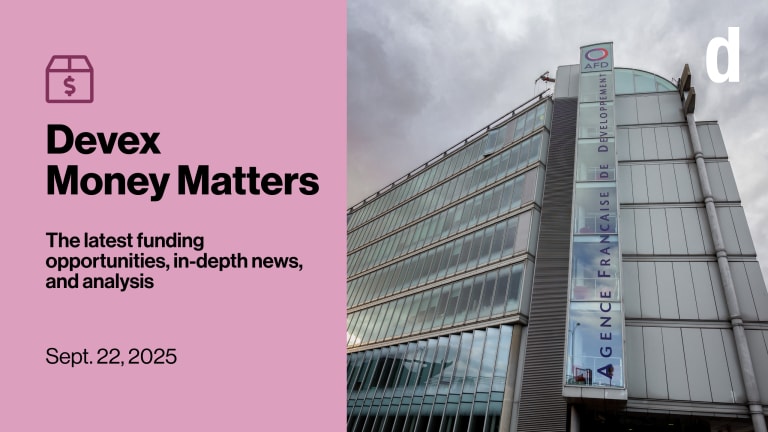Presented by World Health Summit

After nearly a decade of painstaking planning, an innovative education financing tool is finally up and running, with new projects, partners, donors — and grand ambitions to not let aid cuts get in its way.
Also in today’s edition: The European Union lets down least developed countries, and the U.S. Congress has a marathon session.
+ Next week, Devex will be in New York in full force for the high-level week of UNGA80. We’ll be bringing you panel conversations, podcast appearances, interactive workshops, networking events, and a steady stream of newsletters and daily reporter’s notebook entries.
Visit the Devex Impact House page to learn more about our programming from Sept. 22-24, and to request an invitation to join in person or virtually.
The IFFEd that keeps on giving
If you could turn $1 of donor funding into $7 of project finance, would you? Of course. That’s the hope, at least, of the backers of the long-awaited International Finance Facility for Education, or IFFEd, which is designed to unlock large-scale, affordable financing to bridge the widening gap between current education aid, which sits at just $16.6 billion, and the estimated $97 billion required annually to meet the U.N. Sustainable Development Goals on education.
“Shrinking aid budgets don’t mean shrinking ambition,” the facility’s founding CEO Karthik Krishnan tells Devex contributor Sophie Edwards. “IFFEd’s smart aid approach gives us the means to do more with less.”
IFFEd aims to boost learning in lower-middle-income countries by mobilizing more low-interest loans from multilateral development banks. It focuses on these countries because they are home to nearly half the world’s population but have difficulties accessing concessional and development finance, making them less likely to borrow for education and skills development, Krishnan explains. But by neglecting to invest in their human capital, these countries risk slipping back into low-income status.
Having initially hesitated, the World Bank is now set to partner with IFFEd, joining the Asian Development Bank, which is already working with the facility in 10 countries. IFFEd is also in talks with the Islamic Development Bank about joining forces.
The partnerships are urgent.
“Education is taking a back seat because it’s a silent crisis; it takes 20 years before it explodes in your face,” Krishnan says. “But only investment in education will help a country go from being a lower-middle-income to a middle-income country.”
Read: ‘Moonshot’ education finance facility aims to turn $1 into $7 in LMICs
EU’re on your own, kid
12%
—That’s the share of European Union and member states’ aid-for-trade funding that went to least developed countries, or LDCs, in 2022, well below the 25% commitment set for 2030.
What does it all add up to? According to a new report from the European Court of Auditors, the EU is failing to live up to its pledge to direct more trade-related aid to the world’s poorest countries, my colleague Jesse Chase-Lubitz writes.
The EU’s development assistance is outlined in its Global Gateway strategy, which was launched in 2021 as a broader initiative to mobilize investment in digital, energy, and transport infrastructure. It largely advocates blending grants with loans to crowd in private finance.
But auditors warn that because LDCs often struggle to access loans or attract private investors, they risk being sidelined in a Global Gateway model that leans heavily on private sector financing.
“While the Global Gateway is well placed to promote the EU aid for trade agenda, there is a substantial risk that the focus will increasingly be on larger geostrategic projects in emerging economies, at the expense of smaller ones in more challenging and poorer contexts based mainly on development objectives,” says San Bilal of the European Centre for Development Policy Management.
Read: EU aid-for-trade for poorest countries falls short of targets, auditors warn
Margin for Arrow
As many of us have learned by now, listening is different from hearing. The latter is registering noise. The former is absorbing information.
The Mighty Arrow Family Foundation, a small family foundation based in the U.S., has worked hard to engage in active listening to better understand its grantees and shape itself around their needs.
Jordana Barrack, executive director of the foundation, recently spoke to Devex during a Pro Funding Briefing about how genuine listening can upend assumptions, rewire relationships, and make funding more effective.
Trust is also a key ingredient in the process.
From the start, Mighty Arrow was rooted in the trust-based movement famously popularized by philanthropist MacKenzie Scott.
Barrack said that the foundation typically uses three-year funding cycles, and that the conversations at the end of each year are not focused on whether the grantee has hit targets, but on what they need.
“We don’t have to have the type of conversation where our partners are trying to impress a funder in order to qualify for the next year of funding,” she said. “We can have really hard conversations. We could say, ‘What are you really wrestling with?’ And that led us into deeper relationships with these people.”
Read: What one foundation found when it listened to its grantees (Pro)
+ Try out Devex Pro Funding today with a free five-day trial and explore funding opportunities from over 850 funders with the data analysis and industry intelligence you need to win them, in addition to all our exclusive analyses, briefings, and news content.
Where’s the coffee?
Yesterday was a big — and long — day for the U.S. House Foreign Affairs Committee, which spent more than 20 hours (and counting) debating the future of the State Department. It was at times a contentious affair, including lawmakers bickering over whether the process of developing bills was a bipartisan one.
It was clear that reauthorizing the State Department is important to committee chair Rep. Brian Mast, a Republican from Florida, who said that when he asked for the job he promised the first comprehensive State Department reauthorization since 2002. “We are taking that action today, but this can’t be done as a one-off. It should be the ambition of all of us to do this, not just every Congress, but every year moving forward.”
That might be a tough sell: Historically, passing sprawling State Department reauthorizations has been difficult, and there is no guarantee that this set of bills will succeed, my colleague Adva Saldinger, who sat through the day’s political wrangling, tells me.
Lawmakers discussed a number of bills addressing structural or organizational changes at the State Department, along with hundreds of amendments. Some of those structural bills gained bipartisan support, but not the bill outlining a new structure for U.S. foreign assistance, which the State Department took over from the now-defunct USAID.
The top Democrat on the committee, Rep. Gregory Meeks of New York, said he could not support a revamp of the State Department that would “rubber-stamp” or “codify” the administration’s “illegal actions to shutter USAID.”
Adva has been tuning into the markup and will have a full readout later today.
Background: US lawmakers propose sweeping State Department reforms
The network effect
Whether you’re a seasoned consultant or someone looking to break into the field, the landscape is uncertain and the competition is fierce. But that’s no reason to give up.
To help current and aspiring consulting professionals alike put their best foot forward, Devex hosted an ask-me-anything digital event featuring insights from Kelsi Kriitmaa, a Geneva-based social impact coach, and Jami Johnson Darkoh, an experienced global health and development consultant based in Cape Town, South Africa.
Networking was a frequent topic of conversation.
“I really cannot emphasize enough how much the networking really, really matters,” said Kriitmaa. “Find out information about them, send them messages, send them peer-reviewed journal articles or events,” she said. “Be in their ecosystem, and invite them into yours before you’re asking for something.”
“It’s harder, it’s more competitive, [and] for sure, the sector has contracted,” Darkoh said, “but there are still opportunities there.”
Read: How to succeed as a development consultant — if you're really trying (Career)
+ A Devex Career Account membership lets you unlock the article and enjoy other benefits including regular special reports analyzing development career trends, access to the full Devex job board, a highlighted profile on the Devex database, exclusive events for insights and advice from top recruiters and sector leaders, and more. Start your 15-day free trial now.
In other news
A global poll of over 36,000 people in 34 countries commissioned by The Rockefeller Foundation finds that while 75% support international cooperation on issues such as health, climate, and trade, institutions such as the United Nations and the International Monetary Fund received relatively low trust ratings. [Reuters]
Five U.N. peacekeepers died after their armored personnel carrier crashed and rolled over into a river in the Central African Republic. [AP]
A Médecins Sans Frontières nurse died Tuesday when an Israeli air strike struck near his tent in Gaza, making him the NGO’s 13th worker to die since the conflict began. [MSF]
Sign up to Newswire for an inside look at the biggest stories in global development.








